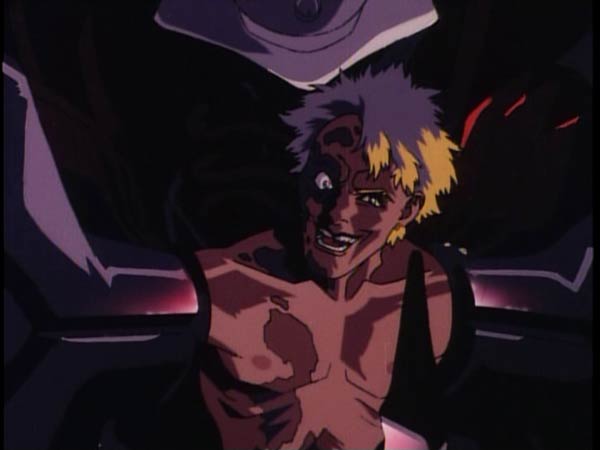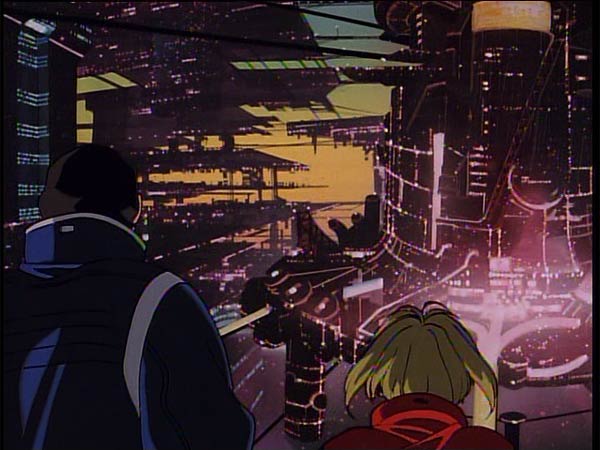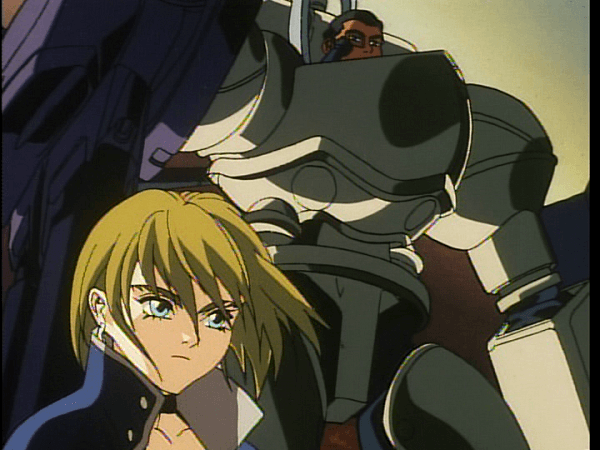 |
| From https://shinden.pl/res/images/genuine/201476.jpg |
Directors: Hiroyuki Ochi, Satoshi Saga, Takuya Satō and Yukio Okamoto
Screenplay: Chiaki J. Konaka
Voice Cast: Elizabeth Berkley as
Naomi Armitage, Kiefer Sutherland as Ross Sylibus, Dan Woren as D'anclaude, Barry
Stigler as Asakura, Bryan Cranston as Eddie, Dorothy Fahn as Kathy/Kelly
McCanon, Ellyn Stern as Rosalind
Synopsis: The moment he steps into a space port on colonised Mars,
a member of Earth's police force Ross Sylibus (Kiefer Sutherland) finds himself immediately involved with a
conspiracy when a female country singer is not only found murdered, but revealed
to be a highly advanced form of bio-mechanical robot. Amidst Mars and the
growing anti-robot sentiment among the human populous, he also meets the
mysterious and cocky police officer Naomi Armitage (Elizabeth Berkley), a ball of fiery energy whose emotional
investment in the case, as more advanced robots are targeted by a lunatic, is
of great significance.
[Major Spoiler Warnings]
Armitage III: Poly-Matrix is a fascinating curiosity of earlier
Western anime fandom. This is, significantly, a theatrical re-edit of a four
episode 1995 OVA series where the run time is at least over two hours, making
this a ninety minute production which still works as a story but had to excise
a lot to get its length. It's also very well known for the casting of known
Hollywood actors in the leads. The female lead Naomi Armitage by Elizabeth Berkley, post Save By The Bell and just after the
infamy of Showgirls (1995), and as
male lead Ross Sylibus by Kiefer
Sutherland, son of Donald Sutherland
and an underrated actor in his own right. As a result, I can review the
original OVA version, which was released before and after the alternative
English language cut, as a separate entity. When it comes to the feature
version, there's both the virtues of the original material, and their problems,
which ultimately stand out the most, the decisions to make the film marketable
to English speaking countries afterwards merely slurring material that is curious
and not perfectly explained in this version's form.
 |
| From http://www.capsulecomputers.com.au/wp-content/ uploads/2012/07/armitage-III-review-2.png |
The story of Poly-Matrix is both interesting but scuppered. It does offer a fascinating idea that there are robots in this futuristic world so advanced to the point they both have real emotions but, mostly female, they can also even conceive children in their bio-mechanical forms. This leads to the one theme which could've been more interested if dwelt more carefully on but, especially in the truncated version, has severe flaws which could be accused as problematic. Its revealed just near the end of the film, which doesn't allow enough time to delve into this, but Earth has become a feminised society, with a female leader, who in potential talks with Mars are severely concerned with how the Martians, in a decadent dystopian future-scape, have female robotic sexbots and servants everywhere, for added touch many looking like stereotypical Moe anime heroines with big eyes and multi-coloured hair in contrast to ordinary human women. It has to be asked whether it's the truncation or the original story which is an issue as, once the conspiracy is revealed, it adds an unintentionally problematic spin on feminism by accident of the theatrical version not providing enough time to clearly define its ideas.
At the same time that leads to a
fascinating spin that could've worked. That even Earth, with a female leader and
meant to be progressive, can yet be being a conspiracy with deeply problematic
moral sliding has a darker, more poignant touch in real life when the #MeToo
movement and attempts at helping women, even by other women, sadly has been
punctured by issues which harm women, even has women harming other women
through unintentional means. (A good example I thought of in the middle of Poly-Matrix was when Meryl Streep, Kate Winslet, Emma Thompson
and Lena Dunham challenged Amnesty International
to withdraw support for decriminalisation of sex work, only for female sex
workers to challenge these major figures back by arguing Amnesty International's decision would actual protect them, signing
their own petitions back to have Amnesty
stick to their choice1).
 |
| From https://static.anarchivism.org/cyberpunkreview- archive/www.cyberpunkreview.com/images/armitage3-13.jpg |
There is also the film tackling, as many sci-fi works, the relationship between human beings and machines. There is a sobering nature to the Martian populous massacring robots in protests, the protests done with understandable reasons of losing work to the robots, but made horrifying as humanoid figures who are built to look like them are torched alive and their machinery piled up in morbid decorations around graveyards. The added issue that the robots seen punished are all female those which are generic machines already having uncomfortable connotations before you get to those in the story with actual emotions. Their deaths makes this intentionally more mortifying, one figure shown briefly to have a life and relationships, a romance with her female model as a painter, only to be a burnt husk on a pyre next to less advanced robots regardless of her real humanity. The end, where female robots watch on at a battle onscreen between the leads and an army sent to silence them, turning their heads with their big eyed gazes despite being merely functioning machinery, has a power to it as if hinting of a potential revolution.
Unfortunately the material is not
as refined and expanded upon as one would hope. It is built as well in a
generic sci-fi action anime, like many from the era and not as unique as them. The
issue that Poly-Matrix isn't that
unique, baring it mind it was once a longer length production, is more
surprising when its screenwriter is Chiaki
J. Konaka. One of my favourite screenwriters, argubly an auteurist voice in
his own right, who is known both for being esoteric and having frustrated many
an anime fan with deliberately ambiguous endings and his work eventually
undermining reality against unreality without defining which is which. For a
very interesting screenwriter, a literal auteur in his penmanship, even a
superfan like myself for every good idea this has confesses this is pretty
conventional and sluggish by his standards. Barring an occasional taste of his
unconventional style - eventually Sylibus and Armitage are in a desert compound
where hulking robot-tree hybrids lumber around like gardening Ents - but he could've
gone further to his weirder tendencies and especially clarified the themes he
was tackling more carefully of gender politics.
 |
| From https://static.anarchivism.org/cyberpunkreview-archive/ www.cyberpunkreview.com/images/armitage3-17.jpg |
There's also the elephant in the room called Ghost in the Shell (1995), which undercuts this production immensely. Mamoru Oshii's adaptation of the Masamune Shirow manga is difficult, in spite of being a seminal work in Japanese animation, long before Oshii became even more difficult and idiosyncratic with the 2004 sequel, but between hairpin turns from action to heavy philosophy he is a very good auteur when it comes to diving carefully into these type of ideas and tackling the likes of robotics and the nature of the human soul with very thoughtful ideas. Poly-Matrix relies on a lot of clichéd tropes common in sci-fi anime, such as the touch but scantily dressed heroine, and throughout you have to wade through an anime that feels significantly more dated than the two Oshii helmed Ghost in the Shell for said clichés. Oshii would've at least taken the potentially problematic gender politics and refined them to actually have a more pointed, morally thorough take with teeth. He would've even gone far, like his later work, to having an action sci-fi story abruptly stop for a long scene of characters sat down discussing gender politics and robotics, even if it enraged most anime viewers and lasted over ten minutes, just to make sure he was as thorough as possible on said subject2.
Production wise, the OVA quality
artistry is good, missed dearly (when it was once so common) to have this type
of insanely detailed, colourful dystopian cityscape of the future. Mars, as
what we see, is already swollen with urban sprawl unless you go to a desert
that has already had the atmospheric process from Total Recall taking place to allow breathable air. The lead
characters are an issue though, in script, design and (English) voice acting. Not
surprisingly, as individuals who work in this medium for their careers, the
regulars of English anime voice acting like Steven
Blum blend in perfectly. Ironically, or maybe not as they would have
experience with anime voice acting, it's the regulars of a production like this
like Steve Blum who blend in perfectly. Elizabeth
Berkley, I confess, at least tries. We find her character Naomi in Showgirls to be ridiculous, but it
suits the character of Naomi Armitage to have casted her. As with Showgirls, where Joe Eszterhas' script was as much an issue for Berkley to overcome, the same issue is here with Armitage being a
paradox. Both the tough cop yet like a teenager in size and obsession with
things like ice cream, a confusing figure for anyone to have to work with. The
hot red leather shorts and shades are a giveaway Berkley was already dealing with the ridiculous tough yet sexy
anime heroine stereotype from this era that would handicap anyone. If her
performance is broad, its only because the character in spite of her dramatic
narrative, being one of those bio-mechanical robots with her own consciousness,
is a broad figure anyway.
 |
| From http://www.anime-kun.net/animes/screenshots/armitage-iii-3897.jpg |
She at least tries. What happened to Kiefer Sutherland, and how he seems to be sleepwalking through his lines, is another thing entirely. It's an embarrassing vocal performance from an actor at this point in his career, even if he had loss his lustre of earlier work and had to wait until the 24 series to become known again, showed he was actually a great actor in oddities like Freeway (1996). For me, like his father Donald, Kiefer Sunderland has always been a character actor, the best kind who could front a major picture but like in Freeway could radiate pure, incredible acting chops in any circumstance. How lifeless his voice sounds as Ross Sylibus here is embarrassing. It neither helps his character is stricken with boring male protagonist syndrome, a plague in anime. This isn't even the worse example, when creators try to appeal more to otaku with blank and shy adolescents in the male lead roles, blank slates for viewers to place themselves as vicariously surrounded by many cute girls. But it's not a credit to Sylibus still as a lead, the stereotypical cop on edge who hates robots because one murdered his female partner, yet even with that or his growing romance with Armitage coming off as mandatory due to Sutherland's performance and the scriptwriting. One of the most pertinent observations I've found as an anime fan that, even if it's in a fan service heavy and objectifying work, in most anime the female characters are the figures you remember with the most personality even when they are crass stereotypes, whilst the males meant to be protagonists have the personality of papier-mâché. Sylibus is effectively the protagonist, and even if Sutherland wasn't sounding like he has dazed, that wouldn't be helped by the blandness of said character.
All in all, Armitage III: Poly-Matrix, followed by a sequel called Armitage: Dual-Matrix (2002) where Juliette Lewis took the titular role
over, is fascinating as a curiosity. It earns enough to justify a revisit in terms
of its ideas, but does with noticeable flaws both in its original material and
the Western adaptation that cuts the legs off some of its best moments
considerably. It does suffer under the weight of other anime which have tackled
this material better or with more idiosyncrasies, but when there is a stand out
moment, it does shine. The decision to compile it into a feature was, likely, a
detriment and it's not a surprise that this is a rare case nowadays when the
faithful, original versions of anime usually are released in the West too.
 |
| From http://www.capsulecomputers.com.au/wp-content/ uploads/2012/07/armitage-III-review-3.png |
====
1) Whilst this strays far from
this being a review of Armitage III:
Poly-Matrix, and is likely to be controversial, I felt including articles
discussing that example I gave will give you ideas of why I felt the comparison was
apt:
2) Another tangent, but
considering Oshii's own spin off of Blood: The Last Vampire (2000), a light
novel named Blood: The Last Vampire:
Night of the Beasts (2000), abruptly halts a vampire horror story halfway
through for a prolonged, chapters long segments of characters at around a table discussing mythology of vampires, Oshii even to the point of unintentional
comedy or to deliberate screw with an audience would draw the philosophy out for a long, long period of time more
than most if he felt like it was necessary.
No comments:
Post a Comment